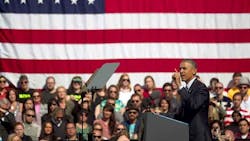Release of Pacific Trade Text Opens New Ratification Fight
WASHINGTON —The long-secret text of the Trans-Pacific Partnership free-trade deal was released Thursday to expressions of support from business but vows by labor, environmental and health groups to fight ratification.
The massive document, posted online by several governments, offered the first detailed look at the world's biggest free trade area, which aims to rip down barriers to commerce and investment between 12 countries comprising about 40% of the global economy.
U.S. President Barack Obama, who strongly pushed the TPP as a foundation for "21st century trade," heralded the pact as offering a boost to the US economy while protecting workers and the environment.
Obama, who must get Congress's endorsement of the deal, said it "means that America will write the rules of the road in the 21st century" rather than China, which is not part of the TPP.
"It's the highest standard trade agreement in history," he said.
Australia's Trade and Investment Minister Andrew Robb said the released documents show "the broad benefits the TPP will bring to our businesses, farmers, manufacturers and world-class service providers."
In Chile, senior international trade official Andres Rebolledo said the text would show Chileans that the lengthy negotiations concluded last month in Atlanta, Georgia "have meant a beneficial and balanced agreement for our country."
Bill Reinsch, president of the US National Foreign Trade Concil, said the TPP has "vast potential to expand U.S. trade and investment opportunities for American exporters and workers with the Asia-Pacific region."
Activists Blast Deal
But activist groups were scathing in their criticism of the full agreement, which now must be ratified by the governments of the 12 countries--also including Japan, Malaysia, Vietnam, Mexico, Peru, Singapore, Brunei, Canada and New Zealand.
They said promised protections for labor rights and the environment, and assurances that drug patent protections would not block the poor's access to vital medicines, were not honored in the final text.
Judit Rius of the global health group Doctors Without Borders said the drug patent provisions "will keep affordable medicines out of reach of millions of people around the world."
And Michael Brine, executive director of the Sierra Club, said the document was "concrete evidence that the Trans-Pacific Partnership threatens our families, our communities, and our environment."
"The words 'climate change' don't even appear in the text, a dead giveaway that this isn't a 21st-century trade deal," he said.
Battle Over Ratification
The release of the text begins the process of each of the 12 governments getting public and legislative approval of the deal. The entire deal must be ratified as agreed, without changes, which could tie the hands of governments and legislators.
Critics says the pact has been done as a pro-business fait accompli, with businesses kept informed of the details during negotiations while the broader public was excluded.
"The TPP really has a corporate agenda ... and does not help working people," said Celeste Drake of the US labor federation the AFL-CIO.
Many governments could face uphill battles on compromises made on opening markets and enforcing social issues, including in Australia, New Zealand, Canada, and especially the United States.
The new speaker of the U.S. House of Representatives, Sen. Paul Ryan, reserved judgment until after he has reviewed the document's 30 chapters.
"Enactment of TPP is going to require the administration to fully explain the benefits of this agreement and what it will mean for American families," he said in a statement.
"But I remain hopeful that our negotiators reached an agreement that the House can support because a successful TPP would mean more good jobs for American workers and greater US influence in the world."
Under the deal, most tariffs were to be eliminated or slashed on everything from beef, dairy products, wine, sugar, rice, horticulture and seafood to manufactured products, resources and energy.
It brooks controversy by forcing countries to broaden access to their markets--for foreign auto parts in the United States and imported cheese in Canada; Japan will have to remove hefty protections for uncompetitive domestic farmers.
But it also expands protections for foreign investors, introduces regulations protecting data and online commerce, and standardizes patent protections for new classes of drugs.
Deborah Elms, executive director of the Singapore-based Asian Trade Centre, said the text's release will end the speculation and guesswork that has accompanied five years of negotiations.
"It will take time and effort for individuals and companies to understand the implications of this agreement overall and for any given sector or industry."
But Matthew Rimmer, an intellectual property law professor at Australia's Queensland University of Technology, said the document "will merely confirm a lot of the existing opposition."
"But, you know, the governments that supported the deal will have to push for its acceptance. So there will be a lot of interesting politics in terms of how that plays out."
Copyright Agence France-Presse, 2015
About the Author
Agence France-Presse
Copyright Agence France-Presse, 2002-2025. AFP text, photos, graphics and logos shall not be reproduced, published, broadcast, rewritten for broadcast or publication or redistributed directly or indirectly in any medium. AFP shall not be held liable for any delays, inaccuracies, errors or omissions in any AFP content, or for any actions taken in consequence.
